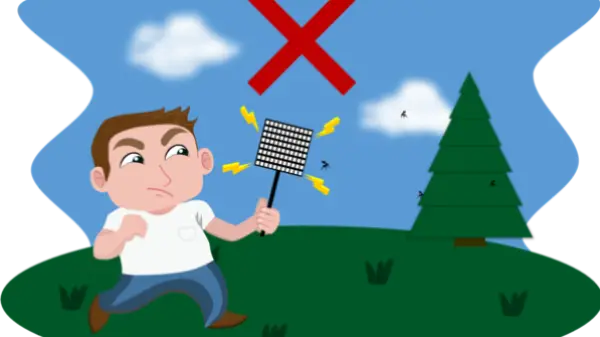
When it comes to your home and outdoor living space, one of the constant battles Hoosiers and Indianapolis homeowners have to deal with is unwanted pests invading your home.
There are tons of tricks, gadgets, and remedies found on the web (pun intended). But before you waste your time, energy, and money, here are some of the most common pest control mistakes for homeowners to avoid.
1. DIY Pest Control Sprays
Because homeowners aren't trained in the proper handling of proper pesticide application, DIY home pest control sprays are rarely effective. Professional pest control technicians practically live and breathe pest control. This allows them to control pests without using overly harsh chemicals that aren't good for the environment.
2. Pest Repellent Plants
Plants that are said to repel pests sound like a great, environmentally safe way to keep the pest at bay. Some of these plants are lemon grass, citronella plants, marigolds, lavender, basil, mint, garlic, rosemary, and catnip. Unfortunately, this is highly ineffective for these two reasons:
- First, it is the odor of the plant that is supposed to repel pests. However, a mosquito's drive to feed is stronger than its sense of smell.
- Second, many "insect-repelling" plants have to ground up to release the full strength of their odor. Otherwise, they won't detour insects at all.
3. Organic Pest control Products
Many organic pest control products rely on the smell of their product to control unwanted pests. While these products generally detract insects with essential oils pests don't like, the scent doesnt last long and they require constant re-application. Again, this method isn't a pest control product, only a repellent. This is a short-term solution for a long-term problem. You're not getting to the root of the problem.
4. Bug Bombs
Bug Bombs are basically smoke bombs full of highly toxic chemical pesticides that are only really useful in cases of infestation. When a bug bomb goes off, it will release a slow-moving cloud of chemical fog. Insects can sense this and retreat deep into walls and other crevises to escape. It will kill pests that weren't able to escape.
Having your home professionally treated afterward will get rid of the insects that escaped the deadly fog.
5. Only treating pets for pests
Veterinarians recommend medications for treating your pets for pests as vital to their health. Many pests are common carriers of many different diseases that they can transmit to your furry family members. But just because you treat your pets, doesn't mean that they will never get bit. Nor are your pets the only victims of bites. Treating your yard for insects and pests is just as important. As the old saying goes; It's better to be safe than sorry.
6. Pest Traps
We've all seen those nasty glue traps that are littered with insect carcasses. They lure insects in with the scent of food, then the insect gets stuck in the glue and dies. I know what you're thinking, it serves them right for not staying outside where they belong. However, this method of pest control won't get rid of your problem.
Colony insects, like ants, collect food then return to their colony to share the food they've collected. If you want to get rid of colony insects, why not use their generosity against them. Using Ant baits is a much more effective way to get rid of your ants. Ants will collect the pellets then return to their colony to generously share the poisoned food. Effectively killing the entire colony.
7. Electric Pest Swatters
Ok, I know this sounds like it would be pretty entertaining and a bit of satisfying payback to obnoxious flying pests. I don't know about you, but I do not want to spend my time constantly swatting at bugs when I could be out on my deck, hanging out with friends and family.
Safe Pest Control Service That Actually Works!

As I stated earlier, pest control is a constant battle. Completely eradicating insects would be next to impossible and ill-advised. First and foremost, insects play an essential role in our ecosystem. For example, Ants help to aerate the soil, disperse seeds, eat organic matter, and are a source of food. Did you know that Mosquitos help pollinate flowers? Also, Fleas, Ticks, and Mosquitos help regulate the animal population in addition to being a food source. Second, many of these insects migrate by hitching a ride on birds, squirrels, and other wildlife. Getting rid of every unwanted insect unrealistic.
With that being said, most homeowners don't need to rely on fleas, ticks, or mosquitos to control the animal population on their property. Nor are they overly concerned with the other wildlife that would come into their yard looking for insects to nibble on. But as any good General knows, understanding your enemy is the key to victory.
One of the best ways to keep down your insect population is to eliminate their habitat. Fleas prefer cool, damp areas close to the ground when they're not hitching a ride on an unsuspecting animal. Ticks and Mosquitos, on the other hand, like moist, humid places. Detour these pesky insects by:
For outside insects:
- Trimming overgrown plants and shrubs
- Keep your lawn mowed regularly
- Clean debris from landscape beds
- Keep your gutters and downspouts clean and clear of clogs
- Change the water in birdbaths every week
- Remove any containers that unintentionally holds water
For insects that are infiltrating your home:
- Seal up any cracks or entry points
- Keep your countertops and floors clean of food
- Clean and sweep regularly
- Dry any damp areas in the home
- Eliminate any pests you have using pest bait
Once you've done everything you can to detract unwanted pests, let your local pest control solution professionals at Lawn Pride take care of the rest. Our Pest Control Technicians are certified and professionally trained. We can control your insect safely and effectively. Our Pest Protection program will protect your home from pest infestations and make your outdoor living space much more enjoyable.
Contact us today for more information and a free estimate on Lawn Pride's Pest Protection Program.
